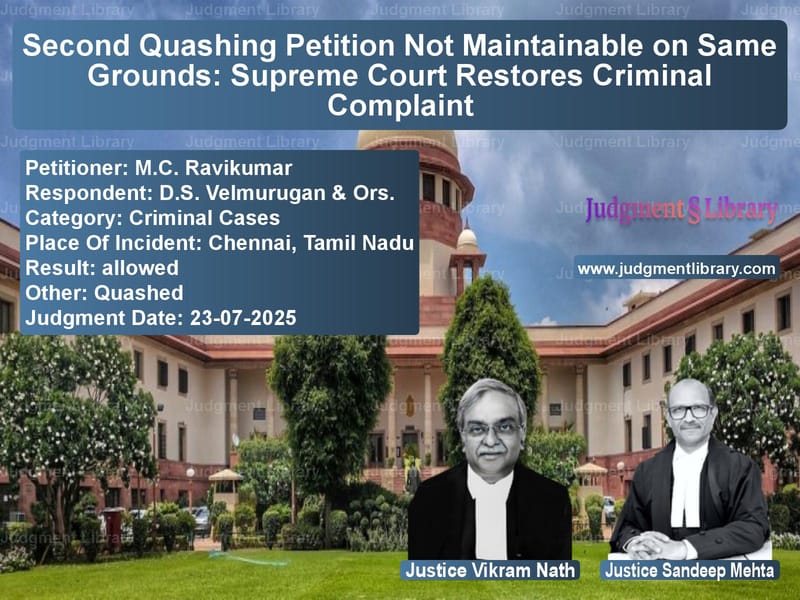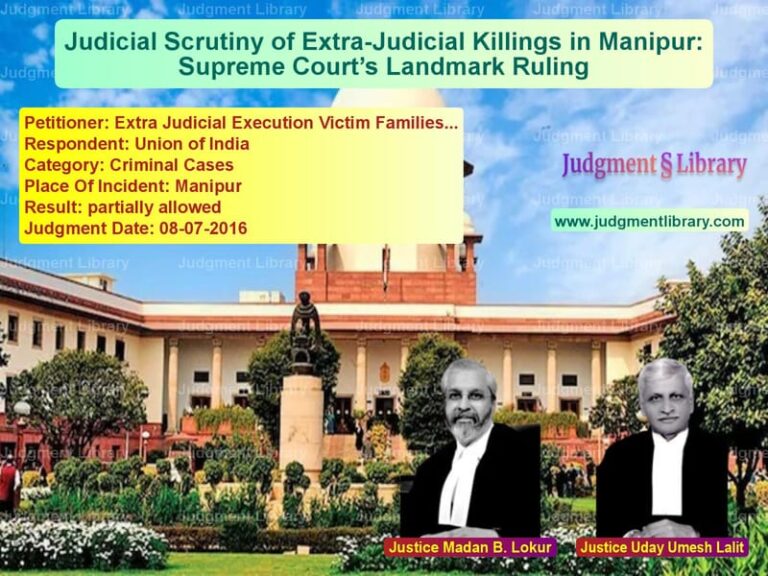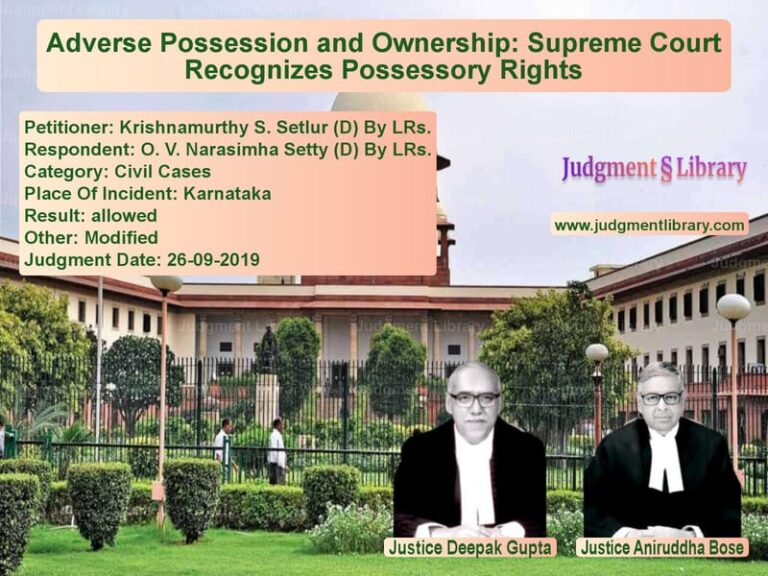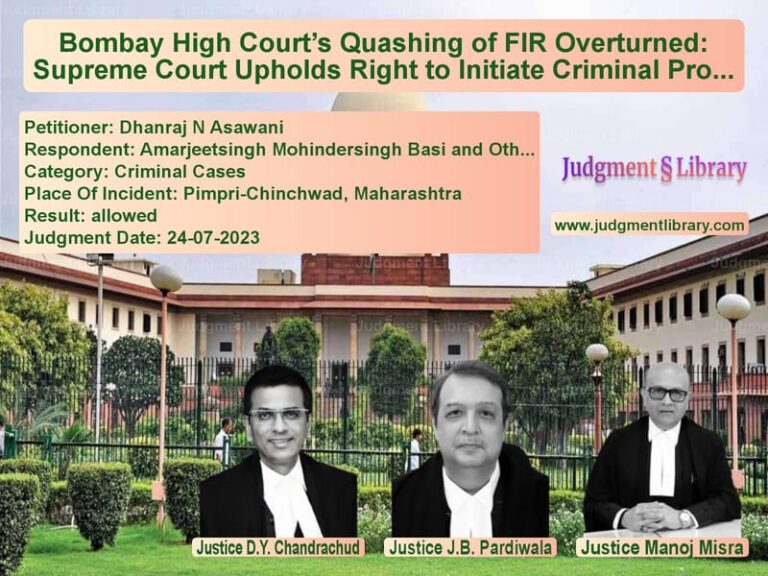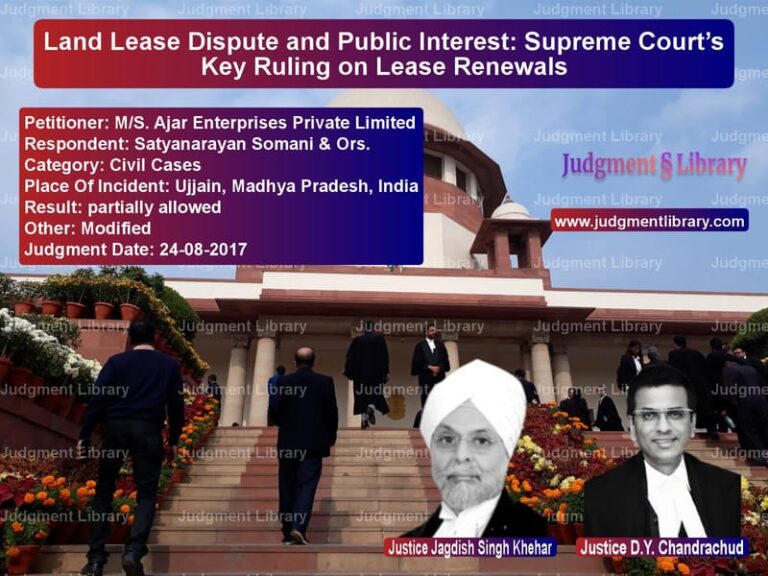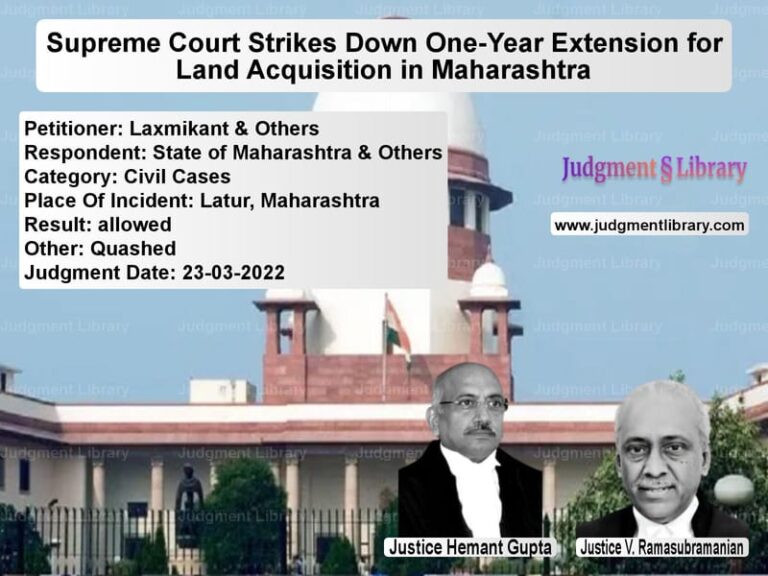Second Quashing Petition Not Maintainable on Same Grounds: Supreme Court Restores Criminal Complaint
In a significant ruling that clarifies the limitations on repeated attempts to quash criminal proceedings, the Supreme Court has strongly deprecated the practice of filing successive quashing petitions on grounds that were available during the first attempt. The case of M.C. Ravikumar versus D.S. Velmurugan & Ors. serves as an important reminder that the criminal justice system cannot be manipulated through repeated legal challenges that essentially seek review of earlier decisions.
The legal battle has its roots in complex financial transactions between the parties. The appellant-complainant, M.C. Ravikumar, had been engaged in travels and finance business for several years. During 2005-2008, he entered into loan transactions with the accused-respondents who were engaged in money lending business. To secure these loan transactions, the complainant provided original deeds of several properties situated at Thanjavur and Chennai to the accused-respondents. An agreement of sale was executed between C. Natrajan (respondent No. 2) and the complainant regarding a flat and a portion of plot situated at Adyar, Chennai on April 25, 2008.
Subsequently, on May 23, 2008, a tripartite agreement was executed between the complainant, one R.R. Vasudevan, and D.S. Velmurugan (respondent No. 1). Under this agreement, Vasudevan paid Rs. 79,00,000 to respondent No. 1, which was actually payable to the complainant. The complainant later cleared the remaining outstanding loan amount totaling Rs. 1,65,98,000 and requested the accused-respondents to return the original deeds given as security. When they failed to respond, the complainant issued a legal notice on August 30, 2011, seeking return of the original documents.
The situation escalated when the complainant alleged that after receiving the notice, respondent No. 1 executed a sham sale deed in respect of the complainant’s property at Thanjavur, which had been given as security against the loan. Upon discovering this alleged fraudulent transaction, the complainant filed a complaint on November 22, 2011, with the Crime Branch, Chennai, which was registered as Crime No. 193 of 2012. The police filed a closure report in this case, which was accepted by the Chief Metropolitan Magistrate, Egmore, Chennai on September 23, 2013. The complainant’s revision petition was dismissed by the High Court on October 24, 2013, and his special leave petition was dismissed by the Supreme Court on January 7, 2015, though with an observation that if the complainant chose to pursue appropriate remedies, the High Court’s observations may not prejudice the same.
Acting on this observation, the complainant filed Criminal Complaint No. 41 of 2015 before Judicial Magistrate No. 1, Thanjavur against respondent No. 1 and co-accused persons. However, the quashing petition filed by respondent No. 1 and other co-accused persons seeking quashing of this complaint was allowed by the High Court on March 9, 2020.
Meanwhile, another development occurred when one P. Jothikumar filed Civil Suit No. 79 of 2018 before the High Court seeking a money decree of Rs. 1,24,62,000 regarding the amount allegedly loaned by him to the complainant. This suit was filed by exhibiting the original documents of the flat, which according to the complainant were actually handed over to the accused-respondents as security.
Aggrieved by these developments, the complainant preferred Criminal Complaint No. 1828 of 2019 before the IX Metropolitan Judicial Magistrate, Saidapet, Chennai against the accused-respondents and P. Jothikumar (accused No. 4) for offenses under Sections 193, 406, 418, 420, 423, 468, 469 read with 34 and 120 of IPC. The Magistrate issued summons against all accused persons on April 27, 2019.
The accused-respondents filed their first quashing petition before the High Court seeking quashing of this complaint, which was dismissed by the High Court through a speaking order on December 22, 2021. After waiting for six months, the accused-respondents filed a second quashing petition before the High Court seeking quashing of the same Criminal Complaint No. 1828 of 2019. The High Court allowed this second quashing petition and quashed the entire proceedings on September 13, 2022, leading to the current appeal before the Supreme Court.
Before the Supreme Court, the appellant-complainant’s counsel vehemently argued that the High Court committed a grave error by allowing the second quashing petition filed by the accused-respondents based on the very same grounds and pleas taken in the first quashing petition. He emphasized that there was no change in circumstances and no new ground existed for entertaining the second quashing petition. The counsel urged that the impugned order amounted to review of the previous order passed by a coordinate bench of the High Court, which is impermissible in view of the bar prescribed under Section 362 of the Code of Criminal Procedure, 1973. He contended that the High Court, while exercising its inherent jurisdiction under Section 482 CrPC, cannot be allowed to review an earlier order as this is expressly barred by Section 362 CrPC.
On the other side, the counsel for the accused-respondents fervently opposed these submissions. He argued that the High Court rightly quashed the criminal complaint by considering that there existed changed circumstances since a similar complaint filed by the complainant regarding property at Thanjavur had already been quashed. He characterized the case as a classic example of abuse of criminal machinery by the complainant. The counsel contended that the impugned order did not amount to review of the earlier order since the second quashing petition raised different grounds and pleas that were not effectively raised in the first petition. He maintained that the High Court has the power to exercise its inherent jurisdiction at any stage of criminal proceedings to prevent abuse of law and manifest injustice, and such exercise cannot be termed as violating Section 362 CrPC. Lastly, he argued that the dispute between the parties is purely civil in nature and the admitted allegations cannot give rise to criminal prosecution, suggesting that the criminal proceedings were initiated solely to harass the accused-respondents.
The Supreme Court, after hearing both parties and examining the material on record, framed the crucial question: ‘Whether a second quashing petition under Section 482 CrPC would be maintainable on the grounds/pleas that were available to be raised even at the time of filing/decision of the first quashing petition?’
The Court firmly rejected the accused-respondents’ submission that the second quashing petition was based on new grounds or pleas. The Court observed: ‘From the bare perusal of the record, it is evident that the second quashing petition raised no such grounds/pleas which were unavailable to the accused-respondents at the time of adjudication of the first quashing petition. The failure of the accused-respondents to raise a pertinent ground/plea which was tangibly available to them at the time of adjudication of the first quashing petition can in no circumstance grant a right to the said accused persons to file a subsequent quashing petition as it would amount to seeking review on pre-existing material.’
The Court reinforced this position by referring to its earlier judgment in Bhisham Lal Verma v. State of UP & Anr., quoting: ‘Though it is clear that there can be no blanket rule that a second petition under Section 482 Cr.P.C. would not lie in any situation and it would depend upon the facts and circumstances of the individual case, it is not open to a person aggrieved to raise one plea after the other, by invoking the jurisdiction of the High Court under Section 482 Cr.P.C., though all such pleas were very much available even at the first instance. Permitting the filing of successive petitions under Section 482 Cr.P.C. ignoring this principle would enable an ingenious accused to effectively stall the proceedings against him to suit his own interest and convenience, by filing one petition after another under Section 482 Cr.P.C., irrespective of when the cause therefor arose. Such abuse of process cannot be permitted.’
The Court further held that the High Court’s order in the second quashing petition amounted to ‘review (plain and simple)’ of the earlier order passed by the coordinate bench in the first quashing petition, since there was admittedly no change in circumstances and no new grounds became available to the accused-respondents after the dismissal of the first quashing petition. The Court emphasized that this was in ‘gross disregard to all tenets of law as Section 362 CrPC expressly bars review of a judgment or final order disposing of a case except to correct some clerical or arithmetical error.’
The Supreme Court reinforced this principle by referring to Simrikhta v. Dolley Mukherjee and Chhabi Mukherjee and Anr., quoting: ‘The inherent jurisdiction of the High Court cannot be invoked to override bar of review u/s 362. It is clearly stated in Sooraj Devi v. Pyare Lal that the inherent power of the Court cannot be exercised for doing that which is specifically prohibited by the Code. The law is therefore clear that the inherent power cannot be exercised for doing that which cannot be done on account of the bar under other provisions of the Code. The court is not empowered to review its own decision under the purported exercise of inherent power.’
The Court specifically addressed the argument about the quashing of a similar complaint regarding Thanjavur properties, noting that this event occurred well before the dismissal of the first quashing petition and was manifestly available to the accused-respondents during the first quashing petition proceedings. Therefore, they were not entitled to invoke the High Court’s inherent jurisdiction raising this ground later through a second quashing petition.
As a result, the Supreme Court quashed and set aside the High Court’s impugned order dated September 13, 2022, and restored Criminal Complaint No. 1828 of 2019 to the file of the IX Metropolitan Judicial Magistrate, Saidapet, Chennai. The Court clarified that all defenses available to the accused-respondents would remain open to be raised before the appropriate forum at the proper stage without being prejudiced by this order or the High Court’s orders.
This judgment serves as a crucial safeguard against the abuse of legal processes through repeated attempts to quash criminal proceedings on grounds that were available from the beginning. It reinforces the principle that the inherent powers of courts cannot be used to override specific statutory bars, ensuring that legal proceedings are conducted efficiently and without unnecessary delays caused by successive petitions raising previously available arguments.
Petitioner Name: M.C. Ravikumar.Respondent Name: D.S. Velmurugan & Ors..Judgment By: Justice Vikram Nath, Justice Sandeep Mehta.Place Of Incident: Chennai, Tamil Nadu.Judgment Date: 23-07-2025.Result: allowed.
Don’t miss out on the full details! Download the complete judgment in PDF format below and gain valuable insights instantly!
Download Judgment: m.c.-ravikumar-vs-d.s.-velmurugan-&-or-supreme-court-of-india-judgment-dated-23-07-2025.pdf
Directly Download Judgment: Directly download this Judgment
See all petitions in Fraud and Forgery
See all petitions in Theft and Robbery Cases
See all petitions in Bail and Anticipatory Bail
See all petitions in Legal Malpractice
See all petitions in Contempt Of Court cases
See all petitions in Judgment by Vikram Nath
See all petitions in Judgment by Sandeep Mehta
See all petitions in allowed
See all petitions in Quashed
See all petitions in supreme court of India judgments July 2025
See all petitions in 2025 judgments
See all posts in Criminal Cases Category
See all allowed petitions in Criminal Cases Category
See all Dismissed petitions in Criminal Cases Category
See all partially allowed petitions in Criminal Cases Category

